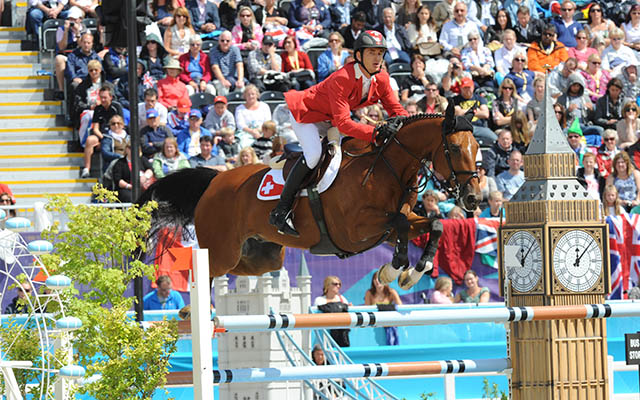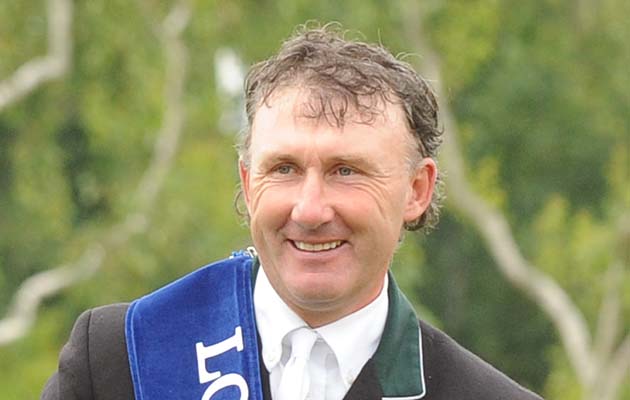The European Equestrian Federation has warned that showjumping’s “credibility” is at risk, while International Jumping Riders Club director Eleonora Ottaviani cautioned against “profiteering” from the pandemic as riders pay sums rumoured to be up to €50,000 to attend European shows. H&H finds out more...
Early in lockdown, international showjumping organisers speculated that their sport would emerge from Covid-19 with new priorities.
Long before the practicalities of social distancing were understood, Olympia and Royal Windsor supremo Simon Brooks-Ward hoped funding would swing back towards footfall from ordinary spectators.
Christophe Ameeuw, promoter of the Longines Masters, felt that the “new normal” would rail against conspicuous consumption. Fans would no longer tolerate “trucks that could carry three houses” and the lavish “pop-up” garden party scenario – expensive hospitality tables occupying two or three sides of the arena.
But a different picture has emerged in Europe, where FEI jumping resumed months ahead of the UK.
{"content":"PHA+V2l0aCBmZXcgc2hvd3MgeWV0IGFibGUgdG8gYWRtaXQgZ3JhbmRzdGFuZC1zZWF0ZWQgc3BlY3RhdG9ycywgZnVuZGluZyBoYXMgcmVsaWVkIHdob2xseSBvbiBzdWJzaWR5IGJ5IHN1cGVyLXJpY2ggb3JnYW5pc2Vycywgc3BvbnNvcnMsIHJ1bW91cmVkIOKAnHBheSBjYXJkc+KAnSwgd2hpY2ggYXJlIHByb2hpYml0ZWQgaW4gRkVJIHJ1bGVzIGJ1dCBpbXBvc3NpYmxlIHRvIHBvbGljZSwgYW5kIFZJUHMsIHdpdGggcHVibGljIHNwYXRzIGJldHdlZW4gcHJvbW90ZXJzIG92ZXIgdGhlIGluZXF1YWxpdGllcyBhcmlzaW5nLjwvcD4KPHA+PGRpdiBjbGFzcz0iYWQtY29udGFpbmVyIGFkLWNvbnRhaW5lci0tbW9iaWxlIj48ZGl2IGlkPSJwb3N0LWlubGluZS0yIiBjbGFzcz0iaXBjLWFkdmVydCI+PC9kaXY+PC9kaXY+PHNlY3Rpb24gaWQ9ImVtYmVkX2NvZGUtMzEiIGNsYXNzPSJoaWRkZW4tbWQgaGlkZGVuLWxnIHMtY29udGFpbmVyIHN0aWNreS1hbmNob3IgaGlkZS13aWRnZXQtdGl0bGUgd2lkZ2V0X2VtYmVkX2NvZGUgcHJlbWl1bV9pbmxpbmVfMiI+PHNlY3Rpb24gY2xhc3M9InMtY29udGFpbmVyIGxpc3RpbmctLXNpbmdsZSBsaXN0aW5nLS1zaW5nbGUtc2hhcmV0aHJvdWdoIGltYWdlLWFzcGVjdC1sYW5kc2NhcGUgZGVmYXVsdCBzaGFyZXRocm91Z2gtYWQgc2hhcmV0aHJvdWdoLWFkLWhpZGRlbiI+DQogIDxkaXYgY2xhc3M9InMtY29udGFpbmVyX19pbm5lciI+DQogICAgPHVsPg0KICAgICAgPGxpIGlkPSJuYXRpdmUtY29udGVudC1tb2JpbGUiIGNsYXNzPSJsaXN0aW5nLWl0ZW0iPg0KICAgICAgPC9saT4NCiAgICA8L3VsPg0KICA8L2Rpdj4NCjwvc2VjdGlvbj48L3NlY3Rpb24+PC9wPgo8cD5UaGVyZSBhcmUgdW5jb25maXJtZWQgcmVwb3J0cyBvZiDigqw1MCwwMDAgKMKjNDQsNjQwKSDigJxwYXkgY2FyZHPigJ0sIHRoZSBzdW0gYSBsb3ctcmFua2VkIHJpZGVyIHByaXZhdGVseSBwYXlzIGZvciBhbiBpbnZpdGF0aW9uLjwvcD4KPHA+VGhlIEV1cm9wZWFuIEVxdWVzdHJpYW4gRmVkZXJhdGlvbiAoRUVGKSBzYWlkIGp1bXBpbmfigJlzIOKAnGNyZWRpYmlsaXR54oCdIGlzIGF0IHJpc2ssIHdoaWxlIEludGVybmF0aW9uYWwgSnVtcGluZyBSaWRlcnMgQ2x1YiAoSUpSQykgZGlyZWN0b3IgRWxlb25vcmEgT3R0YXZpYW5pIHdhcm5lZCBhZ2FpbnN0wqAg4oCccHJvZml0ZWVyaW5n4oCdIGZyb20gdGhlIHBhbmRlbWljLjwvcD4KPHA+4oCcVGVubmlzIGRvZXMgbm90IGFsbG93IGFueW9uZSB3aG8gZmVlbHMgbGlrZSBpdCB0byBwbGF5IHdpdGggRmVkZXJlciBqdXN0IGJlY2F1c2UgdGhleSBoYXZlIHBhaWQs4oCdIHNoZSBzYWlkLjwvcD4KPGRpdiBjbGFzcz0iYWQtY29udGFpbmVyIGFkLWNvbnRhaW5lci0tbW9iaWxlIj48ZGl2IGlkPSJwb3N0LWlubGluZS0zIiBjbGFzcz0iaXBjLWFkdmVydCI+PC9kaXY+PC9kaXY+CjxwPkZvcm1lciBPbHltcGljIGNoYW1waW9uIEVyaWMgTGFtYXplIHdhbGtlZCBhd2F5IGZyb20gTGllciBpbiBCZWxnaXVtLCBhZnRlciBpdCByYW4gMjUyIGhvcnNlcyBpbiBhIDEuNDVtIGNsYXNzLCBhIHNjZW5hcmlvIGFsc28g4oCcdW5hY2NlcHRhYmxl4oCdIHRvIHRoZSBJSlJDLjwvcD4KPHA+QXQgdGhlIG90aGVyIGV4dHJlbWUsIGluc3VyYW5jZSBiaWxsaW9uYWlyZSBTYWRyaSBGZWdhaWVyIGhhcyBob3N0ZWQgdGhlIGZyZXF1ZW50IOKAnEh1YnNpZGXigJ3CoGZvdXItIGFuZCBmaXZlLXN0YXIgc2hvd3MgbmVhciBTdCBUcm9wZXogc2luY2UgSnVuZSwgYWRtaXR0aW5nIG1vc3RseSB0aGUgc2FtZSA1MCByaWRlcnMuPC9wPgo8ZGl2IGNsYXNzPSJhZC1jb250YWluZXIgYWQtY29udGFpbmVyLS1tb2JpbGUiPjxkaXYgaWQ9InBvc3QtaW5saW5lLTQiIGNsYXNzPSJpcGMtYWR2ZXJ0Ij48L2Rpdj48L2Rpdj4KPHA+SW4gYSBub3JtYWwgeWVhciwgU3RlcGhleCBncm91cCBmb3VuZGVyIFN0ZXBoYW4gQ29udGVyIG9yZ2FuaXNlcyBmaXZlLXN0YXIgQ1NJcyBhdCBCcnVzc2VscyBhbmQgS25va2tlIGluIEJlbGdpdW0uwqBIZSBzYWlkOsKg4oCcV2hhdCBpcyBoYXBwZW5pbmcgbm93IGlzIGFjdHVhbGx5IHJlYWxseSBkYW5nZXJvdXMuPC9wPgo8cD7igJxBdCB0aHJlZS1zdGFyLCByaWRlcnMgZnJvbSB0aGUgdG9wIDEwMCBub3cgdGFrZSB1cCB0aGUgaW52aXRhdGlvbnMgb2YgdGhvc2Ugd2hvIHVzZWQgdG8gZ28gdG8gdGhlc2Ugc2hvd3MuwqBPbmx5IGEgc21hbGwgZ3JvdXAgb2YgcmlkZXJzIGlzIHNob3dpbmcgYW5kIGdldHRpbmcgdGhlIG9wcG9ydHVuaXR5IHRvIGVhcm4gcG9pbnRzLsKgV2UgY2Fu4oCZdCBzYXkgd2UgaGF2ZSBhIGxldmVsIHBsYXlpbmcgZmllbGQgdW5kZXIgdGhlc2UgY2lyY3Vtc3RhbmNlcy7igJ08L3A+CjxkaXYgY2xhc3M9ImFkLWNvbnRhaW5lciBhZC1jb250YWluZXItLW1vYmlsZSI+PGRpdiBpZD0icG9zdC1pbmxpbmUtNSIgY2xhc3M9ImlwYy1hZHZlcnQiPjwvZGl2PjwvZGl2Pgo8cD5UaGUgcHJvYmxlbSBpcyB1bmludGVudGlvbmFsbHkgZXhhY2VyYmF0ZWQgYnkgdGhlIEZFSeKAmXMgbmV3IG9ubGluZSBpbnZpdGF0aW9uIHByb2Nlc3MuIFRoaXMgZ2VuZXJhdGVzIENTSSBpbnZpdGF0aW9ucyBpbiByYW5raW5nIG9yZGVyLiBPcmdhbmlzZXJzIG1heSBzdGlsbCBwZXJzb25hbGx5IGludml0ZSAyMCUgb2YgZW50cmFudHMuPC9wPgo8cD5UaGXCoHN5c3RlbSBsYXVuY2hlZCBvbiA0IEZlYnJ1YXJ5IGFuZCBoYWQgYmFyZWx5IGJlZGRlZCBpbiBiZWZvcmUgbG9ja2Rvd24gYmVnYW4uIFRoZSBGRUkgc2hlbHZlZCBpdCBmb3IgbG93ZXItbGV2ZWwgc2hvd3MgYW5kIOKAnGZyb3pl4oCdwqByYW5raW5ncyBwb2ludHMgZm9ywqByaWRlcnMgZ3JvdW5kZWQgYnkgdHJhdmVsIHJlc3RyaWN0aW9ucywgaG9waW5nIHRoZXnCoHdvdWxkIHJldGFpbiB0aGVpciBwb3NpdGlvbnMuPC9wPgo8cD5CdXQgdGhlIGxhdGVzdCByYW5raW5ncyB0YWJsZSBzdWdnZXN0cyB0aGUgbWlub3JpdHkgY3VycmVudGx5IGFibGUgdG8gY29tcGV0ZSBoYXMgYWxyZWFkeSBtYWRlIGdhaW5zLiBNcyBPdHRhdmlhbmkgc2FpZCB0aGVyZSBpcyBubyBwZXJmZWN0IHNvbHV0aW9uLjwvcD4KPHA+4oCcRnJlZXppbmcgdGhlIHJhbmtpbmcgY29tcGxldGVseSBpcyBub3QgYW4gb3B0aW9uLOKAnSBzaGUgc2FpZC7CoOKAnFdpdGhvdXQgcmFua2luZyBjbGFzc2VzLCBwcml6ZS1tb25leSB3aWxsIGRyb3AgY29uc2lkZXJhYmx5LiBUaGlzIHdpbGwgbGVhdmUgcmlkZXJzIGluIGEgbW9yZSBwcmVzc3VyaXNlZCBzaXR1YXRpb24gZmluYW5jaWFsbHku4oCdPC9wPgo8cD5MYXN0IG1vbnRoLCBFRUYgcHJlc2lkZW50IFRoZW8gUGxvZWdtYWtlcnMgdXJnZWQgYWRoZXJlbmNlIHRvIHRoZSBuZXcgc3lzdGVtOyBpZiB5b3VuZyByaWRlcnMgZmVlbCBleGNsdWRlZCBieSDigJxwcmV2YWlsaW5nIG1vbmV5LWRyaXZlbiBuZXR3b3Jrc+KAnSwgdGhleSB3aWxsIGdpdmUgdXAuPC9wPgo8cD7igJxUaGUgaW50ZXJlc3Qgb2YgdGhlIHNwb3J0IG11c3QgYmUgYXQgdGhlIGNvcmUs4oCdIGhlIHNhaWQuIOKAnFRoZSBpbnZpdGF0aW9uIHN5c3RlbSB3aWxsLCB0byBzb21lIGV4dGVudCwgbGltaXQgdGhlIGZyZWVkb20gb2YgaW5kaXZpZHVhbCBwYXJ0aWNpcGFudHMgZm9yIHRoZSBzYWtlIG9mIHRoZSBlbnRpcmUgY29tbXVuaXR5LiBOZXZlcnRoZWxlc3MsIGl0IGlzIGFsc28gYSB0b29sIHRvIGVuYWJsZSB0aGUgcHJpbmNpcGxlIG9mIOKAmG1lcml0IG92ZXIgbW9uZXnigJku4oCdPC9wPgo8cD5JbiBBcHJpbCwgTXIgQnJvb2tzLVdhcmQgdG9sZCA8ZW0+SCZhbXA7SDwvZW0+OiDigJxJZiBJIOKAmGJ1eeKAmSBhIGp1bXBpbmcgdGVhbSwgSSBhbSBhdXRvbWF0aWNhbGx5IOKAmGJ1eWluZ+KAmSByYW5raW5ncyBwb2ludHMgZm9yIG15IGRhdWdodGVyL3Nvbi9mcmllbmQuIEFuIGludGVyZXN0aW5nIGRpc2N1c3Npb24gY291bGQgYmUgaGFkIG92ZXIgd2hldGhlciB0aGlzIGlzwqBhIENvcmludGhpYW4gc3BvcnQgYW55IG1vcmUu4oCdPC9wPgo8cD5PbiBmdXR1cmUgZnVuZGluZywgaGUgb2JzZXJ2ZWQ6IOKAnFRoZXJlIHdpbGwgYmUgYmVsdC10aWdodGVuaW5nIGFjcm9zcyB0aGUgZ2xvYmUgYW5kwqBzdHJlc3NlcyBvbiBsdXh1cnkgYW5kIG5vbi1kaXNjcmV0aW9uYXJ5IHNwZW5kaW5nLjwvcD4KPHA+4oCcTm9uZSBvZiB1cyBoYXZlIHRoZSBhbnN3ZXIgeWV0LCBidXQgcXVpdGUgYSBmZXcgbWlnaHQgdGFrZSB0aGlzIG9wcG9ydHVuaXR5IHRvIGRyb3Agb3V0IG9mIHRoZSBoaWdoLWVuZCBnYW1lLjwvcD4KPGRpdiBjbGFzcz0iaW5qZWN0aW9uIj48L2Rpdj4KPHA+4oCcSSB3b3VsZCBsaWtlIHRvIHNlZSBzaG93cyB3aXRoIGhlcml0YWdlIGNvbnRpbnVpbmcg4oCTIEhhbWJ1cmcsIFBpYXp6YSBkaSBTaWVuYSwgUm90dGVyZGFtIOKAkyBhbmQgc2hvd3MgdGhhdCBoYXZlIGdvbmUgdGhyb3VnaCBnb29kIHRpbWVzIGFuZCBiYWQgdG8gY29tZSB0aHJvdWdoIHRoaXMuIFRoZXJlIHdpbGwgYmUgYSBjbGVhcmluZyBvdXQsIHRob3VnaCBpdOKAmXMgYW4gZW50aXJlbHkgaGVhbHRoeSB0aGluZyB0byBqdW1wIG91ciBob3JzZXMgbGVzcy7igJ08L3A+CjxwPkZpdmUgbW9udGhzIG9uLCB0aGF0IHNlZW1zIGEgcGlwZSBkcmVhbS48L3A+CjxwPgo="}
You may also be interested in…
Showjumping ranking and invitational rules prove to be a hot topic ahead of the FEI general assembly
Horse & Hound's showjumping columnist on why harmonising entry fees hits those on ‘normal budgets’
Credit: TREVOR MEEKS
Horse & Hound's showjumping columnist weighs in on the entry fee debate and stifling talent.
Horse & Hound's showjumping columnist on why the FEI banning back boots could backfire
Stay in touch with all the news in the run-up to and throughout the major shows and events during 2025 and beyond with a Horse & Hound subscription. Subscribe today for all you need to know ahead of these major events, plus online reports on the action as it happens from our expert team of reporters and in-depth analysis in our special commemorative magazines. Have a subscription already? Set up your unlimited website access now





